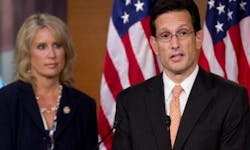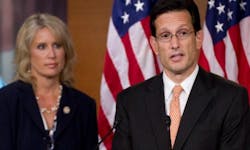The thorough thrashing at the polls (11 percentage points) that will turn out of office the second-highest ranking Republican in the House will rank as a monumental political upset in the history books.
But the impact—“seismic” is how some politicos have put it— of the primary loss yesterday by House Majority Leader Eric Cantor (R-VA) to Dave Brat— whom The Washington Post described as “an obscure professor with tea party backing”— instantly reverberated throughout the corridors of power in Washington.
“His demise will reverberate all the way to the Speaker’s chair, pull the top echelons of the House even further to the right and most likely doom any ambitious legislation, possibly through the next presidential election,” is how Jonathan Weisman and Jennifer Steinhauser succinctly summarized the impact in their analysis piece for The New York Times.
Eric Cantor earliier this week, voicing his approval of the passage of the Transportation, Housing, and Urban Development Appropriations bill.
And the consequences of those reverberations will be felt beyond the beltway, as laid out in a post today by Chris Cillizza, a political reporter for The Washington Post, on his daily Post weblog “The Fix.”
Cillizza advised that his conversations with a “handful of GOP operatives” revealed “several common threads” about what Cantor’s fall from grace foretells “for politics inside and outside the House.”
He details five outcomes, but the one that will have the biggest impact on American business is Cilliza’s contention that “House legislative activity will cease.”
While Cillizza admits “there wasn't a heck of a lot of grand legislative plans before Cantor's loss,” he argues that the “trickle will totally dry up now as Republican members avoid doing anything -- literally, anything -- that could be used against them in the many primaries still to come this summer and fall.
"[House] Members will be afraid of their own shadows," he added.
Historical Footnote: Cantor appears to be the first-ever defeat suffered in a primary by a sitting House Majority Leader.
The “floor leader” office of Majority Leader was created in 1899 by the Speaker of the House, Rep. David B. Henderson (R-IA), to position party leader on the House floor separate from the Speaker, as that role had become more prominent and House membership had swollen from 105 at the start of the 19th century to 356 by then.

